Blog Archives
A Man Not To Francis’ Liking

The provably oldest man in the world just died at 114.
His biography is one of extreme poverty. Started working at 5. Started school at 10. Managed to learn to read only because he was self-taught. It is clear that his entire existence was one of labour, poverty, and faith in the Lord.
There is, in the account that is given of this man, not the lightest shade of the social justice warrior. There is, on the contrary, a clear indication of a life spent in service to the Lord, in the serene acceptance of the way Providence worked in his own life.
If the account is accurate (and there are no reasons to doubt it is), it is realistic to think that this man’s place in heaven will be one of great honour, and of uncommon joy even among the saints. An eternal reward fitting for one who has put his hope in his next life. This guy knows more of return on investment, and of the dividend for his effort, than a ton of people consuming their lives in the finance industry and deeming themselves, no doubt, very smart.
As I was reading the details of this man, I was reminded of what I have stated, on this blog, very often: that a poor and, often, ignorant peasant with a good heart and the grace of a simple, but robust faith is vastly wiser than every triple-PhD credentialed idiot, wasting his life as he nurses his hundred neuroses and his thousand liberal prejudices until the grave catches up with him. Christ does not judge as the world judges. The last will be the first.
But then, even before I stopped reading, I became aware of another, in my eyes, incontrovertible fact: Francis would hate this guy. A guy like this would – whether Francis explicitly admits it or not – cause Francis to simply hate his absence of envy for the rich, his lack of “social conscience”, and his evident refusal to consider himself one of the angry oppressed. The guy, instead, spent his day praying the Rosary twice a day, and we all know that “counting the rosaries” is something Francis openly mocks, too.
In fact, we can now turn Francis’ mockery on himself, and state with absolute confidence that this man’s behaviour is the perfect, mocking answer to Francis’ unbelief.
You keep being stupid in your palatial luxury, Frankie boy. Meanwhile, countless simple, but smart people will live their life in their simple, but smart faith; and will, with God’s grace, merit heaven, fully oblivious of your proto-Marxist propaganda, of your continuous insults to everything that is Catholic, and of your unspeakable arrogance.
I Keep Hoping That he Dies, And He Keeps Not Dying

A new year has just started, and this day marks the end of my extended Christmas holiday (yes it was good, thanks; no, I will give no details, thanks; yes, I got some weight, but not really much, thanks; no, I tried not to think about bad things and problems, thanks).
A happy new year to all my readers.
What do I wish for the Church in 2024? If you need to ask, you haven’t been paying attention.
Often I have prayed that he would die. Not out of personal hate for him (whom, let us be clear, I hate with every cell of my heart and with every neuron of my brain), but for the good of the Church and for the good of the souls entrusted to Her.
I keep praying. He keeps not dying.
Perhaps I am not praying enough. I confess that I don’t pray for his painless death every day. The guy is just not part of my daily prayer routine, nor will he become because I don’t want the thought of him to make me angry in my evening prayers.
However, this is no excuse. I should have prayed for his painless death more often. This is a beautiful New Year proposition: pray more often for his painless death. Possibly every day. The First of January has been already ticked out. Let’s hope it continues.
You might ask: what if he dies? Will not what follows be just as bad, or worse?
I don’t know. It might. But I want him to die because I want the daily recollection that, like him, this period shall pass and, one day, things will get back to normal. I want him to die because I want to have at least a chance that, after him, things will slowly, but actually, get better and we will, one day, mark his death as the nadir of the satanic mess. I want him to die because I forbid myself to not wish the end of a horrible situation, merely because of the risk that the situation might become even more horrible.
I am, also, a born optimist. I never got a new hand of cards without a new hope. When he dies, a new deck of cards will be brought on the table and a whole new game will begin. You might say that the card company has rigged the deck of cards. I say that God can un-rig every deck of cards, no matter how rigged. Particularly if we pray.
Let us, therefore, start 2024 with a solemn commitment to pray more often for his death.
Let a new deck of cards appear on the table soon.
And may God help us all.
Prayer And Providence
We are taught, since we were children, to pray for the things we desire: from health for us and our beloved to a job, a wife, a house, and obviously salvation. We pray for other reasons too, of course, but today I will focus on this one.
However, we are also told that nothing happened that has not been preordained. Non si muove foglia che Dio non voglia, “not one leave moves, but God wants it so”.
How do we reconcile these two apparently antithetical positions? With the most difficult phrase of the first of all prayers: Thy will be done on earth as it is in heaven.
Prayer is not a magic ritual with which I can, in a way, move God to change His mind. God is – whatever idiots and perverts like Francis and Father Jeanine Martin tell you – unchangeable. Perfection can only be omnipotence and immutability of will and being.
God does not change his mind. You do.
Prayer is the process by which I allow myself to wish for a desired outcome that seems good to me, whilst accepting not only that God's will will be done, but that God's will is exactly what is best for me in the end.
My prayer is, at the same time, my submission and my acceptance of whatever outcome God has already established. My prayer is, in fact, the willed embrace of whatever outcome God has already decreed. I am not trying to make God behave the way I want. I am trying to become what God wants me to become. In my prayer, and in my acceptance of what the Lord has providentially decreed, I strive to conform myself to His wish, rather than trying to conform Him to mine.
The Lord has, as we have said, providentially decreed, already now, whether my prayer will be answered. Whatever happens it is good that it be so (in which way exactly I will see after death).
Why, then, pray?
Because it is part of God's providential plan that we pray. Because if God wants to give a certain desired good – say: a job, a wife, a house, and most of all salvation – He is very likely to want me to pray for it, uniting my collaboration to His already made, immutable will and unchangeable decision; so that, once again, I may be changed as I receive what I asked for. And if he does not want to answer my prayer, it is because it is better for me that He doesn't (which can happen in a varieties of ways, some of which very clear to me: to teach me submission, obedience and abandonment to His will are the easiest to understand).
God wants that we ask Him for both what he gives us and what he does not give us. And he wants us to ask for it with stubborn determination. The wife who sees, after 50 years of prayers, her husband abandoning his atheism has not decided, after 17.5 years, that she has prayed for long enough. She does not stop asking, she does not stop hoping. She accepts the final outcome all the time. But what joy, to know that God has allowed one to collaborate with Him in the salvation of her husband's soul, with 50 years of prayer!
In this way, prayer and Providence are intertwined; our prayers are the threads of our life, and God is the one who, after giving us the threads in the first place, weaves with them the canvas He has decreed.
In this understanding of prayer is the key to a much happier life, because it teaches us to grow in humility and to submit to God's providential work, knowing that what he sends us is, without exception, what we need to grow in faith and get nearer to Him.
M
Prayer, The Rosary, And Salvation
We cannot, strictly speaking, merit Salvation. Strictly speaking, we cannot and do not merit anything at all. Whatever we have, God has given us. Whatever we attain, God has preordained that we should be given the grace to do so. This applies to absolutely everything we do, up to the last consequences and our eternal destiny. God has, in His Justice, preordained from all eternity whether we will be saved or damned, whether we are elects or reprobates. This brutal truth is a mainstay – nay, it is the foundation – of Catholic theology. If it were not so, God would depend on our decisions and would, therefore, not be Omnipotent.
I can, of myself, merit exactly nothing. What I do is merely collaborate with God's grace; and even this collaboration is, in fact, nothing more than God's grace: an unmerited gift.
The human mind being very limited, and unable to fathom how in God infinite Justice and infinite Mercy meet, the statement above appears rather scary. It is, in fact, not pleasant to realise that God has already decided, out of all eternity, whether I will be saved or damned. What I can know with certainty is that I am given sufficient grace to collaborate with God's will and – in this strict sense – “merit” Salvation. What I do not know is whether I will persevere in making use of it. I don't know; God not only knows, and He Has decreed what the final outcome shall be.
Now, whilst I try to cultivate the virtue of hope – which is, like everybody else, a gift; I for myself could not have any hope, but God gives it to me -, the uncomfortable thought unavoidably remains: could it be that God has already decreed that I will waste the sufficient grace given to me and deserve to be punished with hell? This fear must, I would add, remain, then otherwise we would be thinking like those Protestant and rosewater Catholics sure of their salvation – and thus, gravely sinning – because they love the polar bear cub or say good morning to their neighbours or are best buddies with Christ (you talk to some Prodfies, you wonder whether they thought they just met Him for breakfast). A healthy Catholic soul is healthily optimistic about his salvation, but healthily scared of hell, too. A just God will judge everyone with perfect Justice. Good and scary thought, uh?
At this point, God gives us – in His Mercy – an ace to be played in the game of salvation: prayer.
Prayer is the antidote to the poison of our sinfulness. It is the passepartout allowing us to base our hope in something we actually do. I choose to pray, and whilst doing so I am aware that it is God's grace that prompted me to pray. But I am still collaborating with His grace.
Prayer is the key that opens the door of God's Mercy. Sinful as I am, I do not need to be terrified that my damnation might already have been decreed, I do not need to be (overly) afraid that I will not make use of God's sufficient grace and waste the possibility of salvation; I do not, because I pray, thus collaborating with God in opening a path for me in which mercy will supply what justice cannot give.
This is why a prayerful attitude is a very good sign of predestination. It is the evidence, in our daily life, that we are collaborating with God in such a way that we can be very reasonably, very robustly confident that His Mercy will supply that in which we are, by justice, deficient.
I do not know whether I am one of the elect. But I know that I pray the Rosary every day. That is a fact, a certainty, a solid base for my future, the plaster of my way to Purgatory. My healthy fear of hell is, then, reduced to this: a prompt to pray the Rosary every day. Blessed, blessed fear!
The Rosary is the queen of all prayers. No prayer is as safe, as reassuring as the Rosary. Catholic tradition has attached such devotion to the Apparitions about the Rosary and the promises concerning those who pray it, that it is not reasonable – much less smart – to doubt the ones or the others.
Wretched sinner as I am, I know that God's Mercy has opened for me a path to Purgatory; a path following which I can be very confident to, one day, “merit” Purgatory – which, sub specie aeternitatis , simply means that I hopefully will, one day, realise that God preordained and decreed, out of all eternity, that it should infallibly be so – .
Yes, I am still scared of hell. It is good that I should be, lest I neglect prayer and, little by little, abandon the practice of the daily Rosary. The fear of hell is the guard rail that keeps me on the path.
Prayer is the way I live life everyday, confidently hoping that God's Mercy will supply what I, by justice, should not obtain.
What a beautiful thing, prayer. What a wonderful thing, the Rosary.
Pray the Rosary every day as devoutly as you can.
Your path to salvation is right there, in front of you, now.
M
Praying For The Pope
I have very recently published a post in which I have stated that is very much like Pollyanna to think that if we pray really hard the Pope will, well, discover Catholicism. In opposition to this, I stressed the importance of doing more than praying for miracles, that is: to act without waiting for the miracle to happen first.
It goes without saying that this does not mean that we should not pray for the Pope. We pray for the Pope because it is our duty as Catholics to do so, because we are aware of the importance of the Papacy and because we wish salvation to everyone, even Francis. At the same time, we do not allow the prayer to be an excuse for not acting, at least as much as our little sphere of influence allows.
I say this as it appears to me my words have been misunderstood or misconstrued, and I would not want anyone to be misled. I have reread the post, and it seems to me the meaning is rather clear; therefore, the text will not be amended.
M
Suspicious Christianity
This video is another example of all the wrong things going on in Francis’ mind.
Can you imagine a Pope of the past severing the hands of a child joint in prayer! It is disturbing to even think of a father doing this to his son, and no child with some sense of religion would do the same to another child. To Francis, this is worth doing before the cameras.
Disturbing.
Look at the video attentively. The child has his hands joint in prayer. Francis talks to him and seems to ask him whether his hands are incollate, which means “glued together”. The child insists on keeping his hands joint. At this point Francis proceeds to severe by applying a certain amount of gentle but unmistakable force. It seems clear to me the child still does not want to disjoint his hands, and it is only the force (both physical, and certainly derived from the man’s position and authority) of the Pope that reaches the aim of finally separating the boy’s hands.
At this point, the Bishop of Rome says something not easily audible, but containing the words “hai imparato”, which clearly indicates words to the effect of “see? You have learnt (how to do it)!”. The child, though, has more sensus catholicus than the Pope and has, thankfully, not learned: he immediately rejoins his hands in prayer, another sign that Francis’ separation of them was unwanted and unwelcome, and rather forced on him. Boy one, Pope nil.
By looking at this video I cannot escape the conclusion that Francis sees with suspicion every obvious manifestation of traditional Christian piety. Very probably his buddy, Rabbi Skorka, does not join hands in the way of the Christians, so there must be something “Pelagian” and “divisive” in doing things the proper Christian ways.
Notice that Francis is not teaching the child how to keep his hands properly joined in prayer (which the young boy is doing, actually, very well already), but he is rather teaching him not to join his hands in prayer, and is pleased when the boy has “learned” to do it properly. Nor can it be that the child is keeping his hands so frantically pressed together the Pope must teach him a more relaxed attitude. Francis is not teaching how to do it. He is teaching not to do it.
It is too soon to say whether Francis is trying to correct his public image from the one of a clown to one of a Pope, and there is some timid indication he is starting to listen to the one or the other of the (certainly terrified) people around him. Still, it cannot be denied either this man is unable to think straight whenever a camera is present, or he is so advanced in his estrangement from proper Catholic thinking that he does it all the time, with the cameras unavoidably catching him as he lives his “priest-cum-rabbi” homemade spirituality in his daily routine.
Joining one’s hands in prayer is one of the most beautiful gesture at the disposal of a Christian. I do not know exactly what infidels do, but off the top of my head I cannot recollect any Jew or Muslim or Hindu showing his devotion in the same way, though I think other culture may join their hand in a similar way to show respect to a person. Be it as it may, I would say the gesture can be fairly described as typically Christian and, here in the West, very closely linked with Christianity.
Would Francis have straightened the back of a Jew repeatedly bowing in front of the Wall in Jerusalem? Would he have raised a Muslim boy on his kneels, who is bowing in the direction of the Mecca? Would he tell them “now you have learned” after doing so? Thought not….
More in general, this Pope does things that no other pope or even priest would ever dream of doing. From the red nose to this last episode to countless other blunders – the suggestion to the leftist nun to basically disregard missives from the CDF is the first one that comes to my mind – his behaviour is so outlandish one wonders who taught him to be a priest in the first place.
Let us hope the man slowly learns to behave in a way appropriate to a priest and a pope. He isn’t stupid after all.
Mundabor
Changing… Prayers?
I do not know about you, but I find it highly disquieting that the French clergy has now decided to change the French text of the “Our Father”. Do they really think they know better than past generations? Do they really think there is more value in choosing a supposedly more accurate or convenient translation than by leaving the faithful safe in the knowledge they will die with same prayers they were born with?
This “change” introduces the very dangerous concept that the Church might have done things the wrong way even in fundamental things like the “Our Father”. “Look” – the French atheist will say to his friends – “these people say they are the depositaries of eternal truths, and now say to us even in the case of their most important prayer they didn't get it right”.
If you ask me, the vernacular version of the most common prayers should be the one that has been honoured by centuries of private devotions, not the one the last translator who has come around thinks appropriate. A prayer is more than its words. It is an entire world. You don't mess with it.
If the slow usage of the centuries has the effect that the way people understands the meaning of certain words change, then – if you ask me- the proper meaning should be duly explained, not the words changed. The Creed in English says “he descended to hell”, and it is part of Catholic education to know this is the limbus patrum and not the Gehenna.
If we start to play with words in this way, soon nothing will be safe anymore. Is the Hail Mary orthodox? How can I know, if I am praying the version given to me by a XXI Century Jesuit?
Tradition is just this: traditio, “transmission”. Let's transmit to the next generation the prayers we have received from the preceding one. Let's explain what there is to explain. Let us not make linguistic experiments with prayers.
I often say that what was good enough for my grand-grandmother is good enough for me. I can't see why the Our Father should be an exception, nor can I imagine an army of French grand-grandmothers led to erroneous belief by a wrong interpretations of the Our Father.
They were Catholic, you see. They knew things. They weren't people who do not even know how to make the sign of the cross and whose prayers must be dumbed down to match with how dumb they are.
Personally, I think the French clergy should focus their effort on explaining and evangelising, rather than running after language usages of people who don't know jack about what the clergy themselves should teach them.
Mundabor.
Catholic Prayers And Good Soldiery.
I pray, like many of you, my five decades of the Rosary every day. My prayers are, obviously, learned by rote, and repeated in the same way. Like many of you, I tend to be distracted and carried away whilst I pray the rosary, but I soldier on. The modern apps with a different gospel passage for every Hail Mary are a great help, but they are no magic wand, either. We get distracted. It's the human nature. If we were to start the rosary or the decade anew every time we get distracted we could never pray the Rosary in church, and we would likely stop saying the Rosary everyday.
Try to be as focused as you can, but say your rosary every day like a military man.
Besides the main dish of my prayer day (the rosary) I have, like many of you, the sides. I never think of my deceased loved ones without one or three “eternal rest”; I never think of people I love without a short prayer for them; I say an Hail Mary for every cripple or every old man in a wheelchair I see; I immancably say the Prayer to St. Michael The Archangel every time I see a faggot on the street.
Yes, all these prayers only take a very short time; yes, life will absorb me after them as fully as it did before; yes, most of the times I do not experience any kind of spiritual “turbo kick” after praying them.
I pray, because I am a Catholic; I pray prayers learned by rote, because I am a Catholic; I pray even when I am distracted, because I am a Catholic; when I wake up, I immediately say an Hail Mary, because I am a Catholic; I pray before going to sleep, and actually often fall asleep whilst mechanically repeating “Hail Mary”, because I am a Catholic. I have a reminder on my phone that tells me it's 3pm, so I can say an “Our Father” at the hour Christ died. Small things like that. Catholicism is largely made of small things.
I am fully aware that all this has a mechanical element in it. My morning Hail Mary could often be prayed better, and many people pray much more. My intra-day prayers are said by rote, as a kind of short-circuit in my daily life. My evening prayers have, at times, a sleepy quality in them. I could certainly do better, but then again I am doing better now than I did some years ago. My rosary is good on certain days, and less good on others, but I must not fight the laziness of not saying the Rosary anymore. It goes under the skin, you see, and you end up praying much more than you used to do even outside of the Rosary. Still: I have, most certainly, room for improvement. I think I will carry it to my grave.
The prayer life of a Catholic – I mean, of most of them – has always been like this: a soldiering in Christ, where the short glorious battle events are lost in the banal routine of military life: the drills, the making of the bed, the meals, all the unromantic, unexciting, uninspiring routine. A good soldier does not say: “who cares whether my bed is properly made: all I want or care for is battle!”. A good soldier knows that soldiering is made of many little things, and that the care with which he cleans his rifle is very important even if he might never have to use it in action.
Soldiery is, in the end, made largely of routine work. It is made, if you will, by rote. Catholic soldiery has, through all ages, been no different than this.
When my mother taught me the Hail Mary, she paid attention I had learned the words. Not the feeling. Not the “dialogue with Mary”. The words. Ave Maria, piena di grazia…
Why? Because this is what Catholics do. Catholics pray in set words. Of course, they can pray differently, and it is certainly not forbidden to a Catholic to throw himself at the feet of the Blessed Virgin and pour out to her the sorrows that plague him. But being a Catholic he will know – like countless generations before him – that this is, strictly speaking, not even necessary. He knows that when he prays in the set words transmitted to us by tradition, he has prayed well. For many centuries now, all Catholics from the illiterate peasant to the refined Prince have known this. This is, by the by, one of the reason why there are so many Catholic prayers.
But there is another reason, that I do not want to leave unmentioned. Catholic prayers are set in fixed words so that they: a) teach properly, and b) give a guarantee of orthodoxy.
Our set of rote prayers tell us a lot about Catholicism. The Litanies are doctrinal expositions; the “Hail, Holy Queen” reminds us that we live in a vale of tears, that we will only see Jesus if we are saved, & Co. At the same time, by praying set prayers we know that we are led through the straight railway of Catholic orthodoxy. Prayers are guaranteed right, and are sure to teach us properly. Spontaneous prayer achieves neither.
This system served countless generations of faithful before us. Yes, we are imperfect. Yes, we get distracted. Yes, we may even fall asleep whilst praying.
Welcome to Catholicism.
——————
All this seems, as I write this, to be rather out of favour. Whilst Francis will not tell you you must not pray the “Hail Mary” or the “Our Father”, it is not clear when he draws the lines and says “enough of rote praying”.
What is clear is that God himself has given us the “Our Father”, but the current Pontiff doesn't see the serial repetition of this prayer with a favourable eye. It is also clear that the Blessed Virgin has – with several apparitions to, among others, Saint Dominic, Blessed Alain de la Roche, and the children of Fatima – recommended the recitation of the Rosary, but the Bishop of Rome sees all this – if you can read beyond the Francispeak; which you can – as now past its shelf life, a habit of past ages that is outdated and below the standard of the smart generation of post V II Catholics.
Once again: Francis doesn't do frontal attacks. His judgments (Heavens, he does a lot of it!) are always directed towards not exactly identified “bad Catholics”, who always end up looking like your grand-grandmother.
Again, he will use Francispeak. The “bad Catholics” are always described in a way that in the end allows you to say “he is not talking of me”, whilst also saying an awful lot that actually screams he is talking about me, big time.
The prototypical Catholic of once – and the traddie of today – are his obvious target, and the message is being understood more and more clearly as the repeated affirmations make it more and more difficult to attribute the quality Francis criticises to people who do not exist at all. If these people exist, then it's us.
You pray the rosary in a – somewhat – mechanical way? Check, and actually you probably do not even believe in God.
You count your rosaries? You are a Pelagian!
You are extremely sure of your Catholic faith? You have “excessive doctrinal security”.
You pray by rote? You are following a custom of the past.
Is it a surprise this Pontiff is so ignorant of even the basis of Catholicism? Lex Orandi, Lex Credendi. If his prayer life is made of inordinate waffling his very way of seeing Catholicism will, one day, follow. It is obvious this man has not the faintest idea of not only basics like the works of mercy, but even the very essence of Christianity, as he manages to be very vague, but vaguely disturbing, even when he says to Eugenio Scalfari in which strangely and I would say uniquely defined God he believes. If Athanasius would read his description of God given to Scalfari he would, I think, not call him an heretic, but would probably decide the man needs a lot of work, because his way of talking of God does sound strange indeed.
This is one who has been making his own “bespoke” religion for many decades now; the unavoidable result of making his own, “bespoke” prayers for the same length of time.
Lex Orandi, Lex Credendi.
Hippie prayers, Francis.
Mundabor
Mother Kills Her Baby, Considers Prayers For Her “Threatening”
A young Feminazi mother has the satanic idea of posting on the Internet material (allegedly) concerning the murder of her own baby.
The horror finds an echo on pro-life sites, and as a result the young she-Himmler starts to receive emails of various kind; many of them, no doubt, explaining to her in detail what kind of person she is, and whereto she is headed. These she calls “hate mails” and up to here, we can call this ordinary liberal madness.
Where the liberal madness becomes extraordinary is in the following affirmation of the young Nazi murderer, here given in the context of the interview. Emphases mine:
She noted the content of numerous “hate” e-mails was some variant of the message: “Maybe you do not know God or that abortion is a sin? Praying for you!”
“Even hearing that someone is ‘praying for me,’ in this context, feels demeaning and threatening. There’s already plenty of hatred and fear-mongering out there for people to encounter,” she said.
Let me sum this up for you: the woman kills her own baby, but considers it threatening if someone prays for her. She murders her child and doesn’t consider this “hatred”, but the prayers for her soul.
If such phrases had been put in mockumentary about Nazi leaders, they would have been considered ineffective, because too stupid to be believable. Still, in the context of Feminazism they appear perfectly trustworthy.
Seriously, Hitler and Himmler couldn’t hold a candle to these people.
I will be praying for the homicidal Feminazi nevertheless. Her being murderous does not exempt me from praying for her, nor her from receiving my prayers.
Actually, the circumstances make the need for prayer more pressing.
Mundabor
Prayer Appeal For The FSSPX
Messa In Latino invites the faithful Catholics to pray for the full reconciliation between the FSSPX and Rome.
After consultation with priests collaborating with the site, the following prayer has been published:
V/.Veni, Sancte Spiritus,
R/. Reple tuorum corda fidelium, et tui amoris in eis ignem accende.
V./ Emitte Spiritum tuum et creabuntur;
R./ Et renovabis faciem terrae.Oremus
Deus, qui corda fidelium Sancti Spiritus illustratione docuisti, da nobis in eodem Spiritu recta sapere, et de eius semper consolatione gaudere. Per Christum Dominum nostrum. Amen.
My unworthy translation:
V. Come, Holy Ghost,
R. Fill the heart of your faithful, and kindle in them the fire of your love;
V. Send your Spirit, and it will be a new creation;
R. And you will renovate the face of the earth.Let us pray
O Lord, who with the light of the Holy Ghost instruct the faithful, grant us to taste, through the same Spirit, what is right* and to always enjoy His comfort. For Christ our Lord. Amen.
The prayer should be recited between Pentecost Sunday and Trinity Sunday.
Those who recite the Rosary daily are asked to offer the rosary for this intention.
Priests are asked to add this to their intention during Mass.
Mundabor
* the site’s italian translation of recta is given with “la vera sapienza”, “the true wisdom”.
Father Z’s Prayer Before Connecting To The Internet
Father Z composed this prayer some years ago.
The original is, as it was to be expected, in Latin, with an English translation. Readers of several countries have added translations in their own language. The translation in “Romanaccio” (Roman dialect) is extremely hilarious but I doubt many people will be able to appreciate it as it deserves…..
As this little blog attracts readers from the most unexpected countries, it might be useful to follow the link and to give a look at the latin and English version and, if available, at the version in one’s own language.
Below the Latin and English Version for convenience.
LINGUA LATINA
Oratio ante colligationem in interrete:
Omnipotens aeterne Deus,
qui secundum imaginem Tuam nos plasmasti
et omnia bona, vera, et pulchra,
praesertim in divina persona Unigeniti Filii Tui
Domini nostri Iesu Christi, quaerere iussisti,
praesta, quaesumus,
ut, per intercessionem Sancti Isidori, Episcopi et Doctoris,
in peregrinationibus per interrete,
et manus oculosque ad quae Tibi sunt placita intendamus
et omnes quos convenimus cum caritate ac patientia accipiamus.
Per Christum Dominum nostrum. Amen.ENGLISH
A prayer before logging onto the internet:
Almighty and eternal God,
who created us in Thy image
and bade us to seek after all that is good, true and beautiful,
especially in the divine person of Thy Only-begotten Son, our Lord Jesus Christ,
grant, we beseech Thee,
that, through the intercession of Saint Isidore, Bishop and Doctor,
during our journeys through the internet
we will direct our hands and eyes only to that which is pleasing to Thee
and treat with charity and patience all those souls whom we encounter.
Through Christ our Lord. Amen.Father Zuhlsdorf
Mundabor
Rosary In Latin
This blog here appears exclusively dedicated to the Rosary in Latin. His wisely anonymous (and therefore, perhaps a “her”) creator did an excellent work in caring for those who have not been exposed to Latin, at all.
The main page has all the prayers in Latin. If you have doubt as to the correct pronunciation, there are several links leading to pronounciation help. There is even an audio version to put what you have learned in practice.
I do understand that for those who have not been exposed to Latin in younger years the switch might come as a shock or that it might be seen as an inuperable obstacle, but this is simply not the case. For generations, innumerable illiterate peasants have recited a number of prayers in Latin and whilst I doubt that their diction was perfect, I am rather persuaded that many of them were better at praying in Latin than many contemporary Brits are at writing in English.
In the case of the rosary, the daily repetition of the prayers will soon allow everyone to feel reasonably comfortable. This is much easier than being confronted with a Latin Mass.
Perhaps the one or the other will take this occasion to give it a try. Perhaps the one or other will take this as motivation to learn and practice the Rosary in his original language first.
I cannot stress enough how important the Rosary is in the economy of salvation. Those who are interested may read more here , here, here, here, here and in the mother of all my blog posts about the Rosary, here
Mundabor
A Rosary Video
I have already posted about the Rosary and you will find an explanation of what it is – and how beneficial its recitation – under the “Catholic Vademecum” button at the top of this page. In this Month of the Holy Rosary, I have found what I think is a useful integration.
This here is, though, a useful integration because it is a video following you step by step and allowing you to enter into the “rhythm” of the Rosary. Various options are at your disposal, from the background you find mor einspiring to two different sets of video to the possibility of joining an already ongoing rosary recitation or starting from the beginning of the five decades you have picked up for the day.
At any time, a virtual rosary (the object) on the right will tell you at a glance where you are in the process.
This product is really interesting in that it gives to beginners, who might be intimidated and not willing to enter a church to see how it’s done, a comfortable way to follow “how it works”.
On a window below you’ll see how many people are praying together with you. This is another important component of the rosary, a devotion that can also be prayed alone but is best prayed with other faithful.
I personally found the video somewhat distracting and to better focus on the relevant mistery had to close my eyes often, but everyone collects his thoughts in a different way. I also stop to meditate shortly on the mistery before starting the Our Father in order to help myself to stay focused, but accomplished rosary prayers will not have this need.
One day I’ll try to see whether there is something like that in Latin, possibly with all the trimmings like the rosary depiction. For the moment, I dare to hope that this extremely well made product will encourage the one or the other to stop hesitating and to finally start with the recitation of the Rosary.
Mundabor
Cristopher Hitchens Still Doesn’t Get It
It is getting more than slightly pathetic to look how Christopher Hitchens, now rapidly approaching the day of the redde rationem, continues not only to ignore the fundamental issue his disease poses to everyone else’s attention, but is even peeved that people pray for his conversion.
Mr. Hitchens writes on the Washington Post:
the offer of prayer can only have two implications: either a wish for my recovery or a wish for a reconsideration of my atheism (or both). In the first instance, a get-well card – accompanied by a good book or a fine bottle – would be just as bracing if not indeed more so. (Also easier to check.) In the second one, a clear suggestion is present: surely now, at last, Hitchens, your fears will begin to vanquish your reason. What a thing to hope for!
This man’s logic is gravely flawed.
In the first instance, the invitation to send get-well cards and bottles of wine instead of prayers is, beside looking very tacky, utterly dismissive of the sincerity of those who pray for his recovery. Love is at work here, and the man doesn’t see it. By the way, this is in contrast with a previous interview of him, in which he had said he was fine with people praying for his recovery; apparently, it must now be wine instead.
In the second instance, Hitchens forgets a great truth, that “the fear of the Lord is the beginning of wisdom”. It is obvious that a faith solely based on fear is far away from the ideal of Christianity, but it cannot be denied that if fear can move this man (or any other man) towards the Truth, then fear is a welcome and powerful instrument for the salvation of souls.
All this escapes Hitchens. He is so much in love with his own love for himself that the idea of having to give away a bit of it seems repellent to him. “Better to slowly die in the terrifying conviction that I am right and complete annihilation awaits me than to bow to something greater than my love for myself”, goes his reasoning.
Mind, he still can’t escape the fear; he’ll just do his very best to refuse wisdom.
After this priceless pearl or arrogance, Hitchens proceeds to write a piece of so unbelievably massive tosh that one has to doubt his oh so often celebrated intelligence.
An intelligent man generally knows what he’s talking about and when Mr. Hitchens talks about Christianity he is supposed to know the first foundations of it; alas, this doesn’t seem to be the case.
Let us read what the man has to say:
“The deity whose intercession is being implored is claimed to be omniscient, omnipotent and omnipresent. It is fully aware of the situation. It can make me a believer if it chooses, or wave away my carcinoma. Why should it be swayed by the entreaties of other sinners?”
The mental confusion here is astonishing, and not due to medicines. It is a basic tenet of mainstream Christianity (and one which Hitchens, who writes about it, is not authorised to ignore) that Hell is a choice God leaves to every individual.
It is a bit too easy to wilfully choose Hell (as Mr. Hitchens continues to do) and then to imply that an omniscient God would make of him a believer if he wanted. Yes he could; but he won’t, and that’s the entire matter.
Mr. Hitchens continue to dodge the fundamental point: it is his choice and his responsibility, and it will be his freely chosen Heaven or Hell. He has written books about God, but he still can’t grasp the basics.
The last part, the “why God would be swayed by prayer” one, is of such ice-cold cynicism that it could only come from a man whose mother has committed suicide. Still, such an affirmation goes to show the absolute nothingness of these “thinkers”, unable to even conceive the infinite power of love and the way Love decides everything, and can change everything.
Mr. Hitchens may have some extenuating circumstances. Still, the tragic occurrences of his life are no excuse for such appalling refusal of love and for such appalling spreading of scandal and perdition.
One may have doubts, and keep them for oneself. One may have hard tests and be unable to pass them. But the spreading of blasphemies on a planetary scale cannot be excused by any personal circumstance. His stance is, in the end, his choice and his responsibility. His brother was born of the same mother and suffered the same drama, but he reacted differently in the end. The one chose the redemption of love, the other the coldness of self-deification.
Mr. Hitchens is receiving the biggest grace of his life. On the wretched platform of his disgraceful existence the last train patiently awaits, the fruit of love utterly unmerited and still freely given.
This train will stay there for a long time, months or perhaps years, patiently wait for him to make the step that would save him. Alas, he seems resolute in refusing to board salvation and in wanting to lose souls with his last breath.
Mundabor
The Litany, Neglected Weapon
The Litany is an ancient form of responsive prayer, by which a series of invocations is made by one person and after each one of the invocations a standard response is recited by all the present. Litanies can, though, also be recited individually at home.
There used to be more than eighty litanies around during the Middle Ages, but in more recent times they have been reduced in number and are today limited to those of both traditional use and proved orthodoxy (e.g. the Litany of the Saints, or the Litany of the Blessed Virgin Mary). You may find slightly different versions of the same litany.
Let us take as example the Litany of the Sacred Heart:
V. Lord, have mercy on us.
R. Christ, have mercy on us.
V. Lord, have mercy on us. Christ, hear us.
R. Christ, graciously hear us.
V. God the Father of Heaven, have mercy on us.
God the Son, Redeemer of the world, have mercy on us.
God the Holy Spirit, have mercy on us.
Holy Trinity, one God, have mercy on us.
Heart of Jesus, Son of the Eternal Father, have mercy on us.
Heart of Jesus, formed by the Holy Spirit in the Virgin Mother’s womb, [etc.]
Heart of Jesus, substantially united to the Word of God.
Heart of Jesus, of infinite majesty.
Heart of Jesus, holy temple of God.
Heart of Jesus, tabernacle of the Most High.
Heart of Jesus, house of God and gate of heaven.
Heart of Jesus, glowing furnace of charity.
Heart of Jesus, vessel of justice and love.
Heart of Jesus, full of goodness and love.
Heart of Jesus, abyss of all virtues.
Heart of Jesus, most worthy of all praise.
Heart of Jesus, King and center of all hearts.
Heart of Jesus, in whom are all the treasures of wisdom and knowledge.
Heart of Jesus, in whom dwells all the fullness of the Godhead.
Heart of Jesus, in whom the Father was well pleased.
Heart of Jesus, of whose fullness we have all received.
Heart of Jesus, desire of the everlasting hills.
Heart of Jesus, patient and rich in mercy.
Heart of Jesus, rich to all who call upon You.
Heart of Jesus, fount of life and holiness.
Heart of Jesus, propitiation for our offenses.
Heart of Jesus, overwhelmed with reproaches.
Heart of Jesus, bruised for our iniquities.
Heart of Jesus, obedient even unto death.
Heart of Jesus, pierced with a lance.
Heart of Jesus, source of all consolation.
Heart of Jesus, our life and resurrection.
Heart of Jesus, our peace and reconciliation.
Heart of Jesus, victim for our sins.
Heart of Jesus, salvation of those who hope in You.
Heart of Jesus, hope of those who die in You.
Heart of Jesus, delight of all saints.V. Lamb of God, who takest away the sins of the world,
R. spare us, O Lord.
V. Lamb of God, who takest away the sins of the world,
R. graciously hear us, O Lord.
V. Lamb of God, who takest away the sins of the world,
R. have mercy on us.V. Jesus, meek and humble of Heart,
R. Make our hearts like unto Thine.Let us pray.
Almighty and eternal God, look upon the Heart of Thy most beloved Son and upon the praises and satisfaction which He offers Thee in the name of sinners; and to those who implore Thy mercy, in Thy great goodness, grant forgiveness in the name of the same Jesus Christ, Thy Son, who livest and reignest with Thee forever and ever. Amen.
The most important aspects of the litany -a powerful instrument, rather than a boring repetition of slogans for people who didn’t have television – are in my eyes as follows:
1) the power of vocal prayer.
Christians believe in saying things out loud. This has been slightly downplayed after V II with its (exaggerated) accent on the personal relationship with God, but the traditional message of a litany is: speak out your prayer, loud and clear. Many traditional devotions are traditionally said vocally. Our grandmothers would have found a mental recitation of, say, the rosary something rather unusual. People who want to feel modern would today talk of “affirmations” (used also in a non -Christian context and, as such, hip) and stress the power of vocal utterances. Christianity already got this, big time, before most “new agers” were born.
2) the power of repetition.
What would appear to be boring is, in reality, a powerful concentration exercise. The (oh so celebrated) insisted repetition of sacred words in Oriental religions follows the same principle: repetita iuvant. You immerse yourself in a prayerful atmosphere, you cast out the cares of the day and your mind is helped to stay focused on the subject of the prayer.
3) the learning element.
One of the reasons why modern Catholics are so tepid to the message of Jesus is because… they do not recite litanies. Litanies are vast reservoirs of both doctrinal knowledge and useful snippets of devotional themes. Look at the litany above and notice how much information it contains: Jesus is – just to make some examples – “source of consolation”, “patient and rich in mercy”, “salvation of those who hope in him”. “I know all that already”, you may say, but the constant repetition of the litany allows not only to know, but to instantly recall when the need arises.
The Litanies are just another element of the rich Catholic devotions abandoned after V II because, well, not Protestant. I seem to notice a resurgence of this beautiful devotion, both in churches and in the wealth of information available on the Internet.
Let us hope that this continues.
Mundabor
The Prayer to St. Michael the Archangel
The prayer to St. Michael the Archangel was created by Pope Leo XIII in 1886 after a vision. The vision was clear as to the fact that the XX century would be the one in which Our Lord would allow Satan to try (if he can of course) to destroy the Church. Leo XIII ordered this prayer to be added to the prayers after mass (called the Leonine Prayers) which he himself had introduced two years before.
Today it appears very clearly how dramatically authentic Pope Leo XIII’s vision was. The XX century has been, indeed, one of great tribulation for the Church, with Satan attacking and severely damaging Her from the inside. Fittingly, the prayers after Mass were officially suppressed in 1964.
More than fifty years later, the devastations caused by Vatican II on one side and – to a much greater extent – from the “spirit of Vatican II” on the other side are all too apparent. We can clearly see now how Satan acted, we have the damages in front of our eyes. Still, we can also see that the Church survived the attack; that she slowly but surely begins to react and to get her act together; that she is now rapidly recovering not only the notion of proper Liturgy, but the understanding of Her mission.
We can also see that even in the midst of such havoc, no doctrinal damage has been suffered. The Holy Ghost has in such difficult times protected the Church as he always does: leaving the men who run Her free to be as corrupt and evil as they want but never allowing them to touch Her doctrinal purity.
Today we see a slow, but unstoppable recovery and have additional evidence that the gates of Hell will never prevail. We stand in horror at the scale of the devastation, but in awe at the way the sancta sanctorum of Catholicism, the doctrinal corpus, has been left undamaged by the bombardments of both the “aggiornamento” and his bastard child, the “spirit of Vatican II”.
I invite the readers to memorize this beautiful prayer and to recite it after Mass and whenever they are confronted with a manifestation of aggressive secularism in their daily lives. It is a beautiful and uplifting prayer. It is wonderfully politically incorrect. It is, I do not doubt, powerful.
English:
Saint Michael the Archangel,
defend us in battle;
be our protection against the wickedness and snares of the devil.
May God rebuke him, we humbly pray:
and do thou, O Prince of the heavenly host,
by the power of God,
thrust into hell Satan and all the evil spirits
who prowl about the world seeking the ruin of souls.
Amen.
Latin:
Sancte Michael Archangele,
defende nos in proelio;
contra nequitiam et insidias diaboli esto praesidium.
Imperet illi Deus, supplices deprecamur:
tuque, Princeps militiae Caelestis,
satanam aliosque spiritus malignos,
qui ad perditionem animarum pervagantur in mundo,
divina virtute in infernum detrude.
Amen.
Mundabor





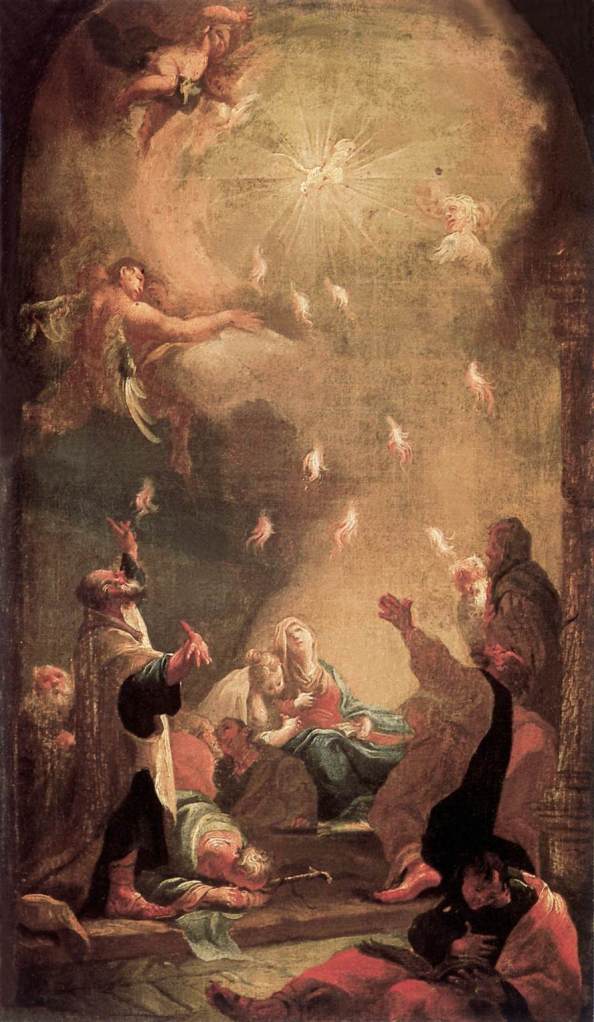



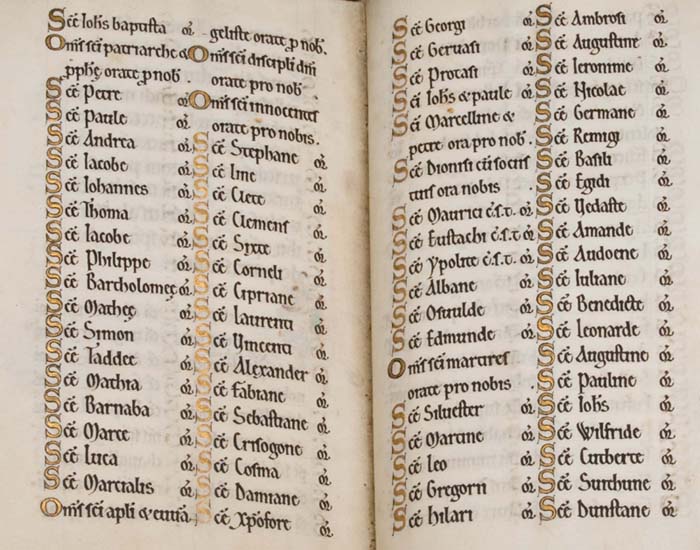





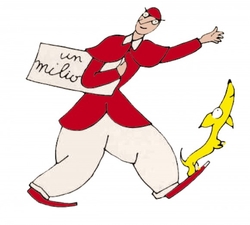



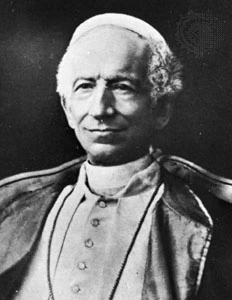







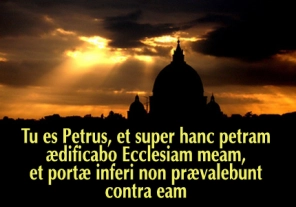


You must be logged in to post a comment.